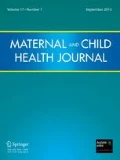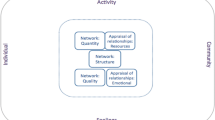Abstract
Introduction Although poverty is an established correlate of poorer mental health for pregnant women, limited research has examined the mental health effects of material hardship (i.e., difficulties meeting basic needs such as for food, transportation, or stable housing) during pregnancy. Methods The current research examined rates of material hardship among pregnant women seeking prenatal care and the relationships of both income and material hardship with depression and anxiety during pregnancy. Pregnant women (N = 892) responded to self-report measures of mental health symptoms, annual household income, and current material hardship in the waiting areas of community-based obstetrics/gynecology practices serving primarily financially disadvantaged patients. Results About 56% of the sample reported some form of material hardship. About 19% of the sample reported elevated depression, and 17% reported elevated anxiety. Both depression and anxiety were uniquely associated with lower income and greater material hardship, even after controlling for age, race/ethnicity, relationship status, and number of children in the home. Furthermore, material hardship partially mediated the effect of income on mental health symptoms. Discussion The physical, emotional, and social effects of deprivation of basic daily needs may contribute to pregnant women’s experiences of mental health symptoms. These results converge with the broader literature focused on the social determinants of physical and mental health. When symptoms of depression and anxiety reflect distress related to material hardship, addressing unmet social needs may be more effective than mental health treatment.


Similar content being viewed by others
References
American College of Obstetricians and Gynecologists. (2015). ACOG Committee Opinion No. 630. Screening for perinatal depression. Obstetrics and Gynecology, 125, 1268–1271. Retrieved February 1, 2018 from https://www.acog.org/Clinical-Guidance-and-Publications/Committee-Opinions/Committee-on-Obstetric-Practice/Screening-for-Perinatal-Depression.
American College of Obstetricians and Gynecologists. (2018). ACOG Committee Opinion No. 729. Importance of social determinants of health and cultural awareness in the delivery of reproductive health care. Obstetrics and Gynecology, 131, e43–e48. Retrieved February 1, 2018 from https://www.acog.org/Clinical-Guidance-and-Publications/Committee-Opinions/Committee-on-Health-Care-for-Underserved-Women/Importance-of-Social-Determinants-of-Health-and-Cultural-Awareness-in-the-Delivery-of-Reproductive.
Blumenshine, P., Egerter, S., Barclay, C. J., Cubbin, C., & Braveman, P. A. (2010). Socioeconomic disparities in adverse birth outcomes: A systematic review. American Journal of Preventive Medicine, 39, 263–272. https://doi.org/10.1016/j.amepre.2010.05.012.
Bödecs, T., Szilagyi, E., Cholnoky, P., Sándor, J., Gonda, X., Rihmer, Z., & Horváth, B. (2013). Prevalence and psychosocial background of anxiety and depression emerging during the first trimester of pregnancy: Data from a Hungarian population-based sample. Psychiatria Danubina, 25, 352–358.
Bourgois, P., Holmes, S. M., Sue, K., & Quesada, J. (2017). Structural vulnerability: Operationalizing the concept to address health disparities in clinical care. Academic Medicine, 92, 299–307. https://doi.org/10.1097/ACM.0000000000001294.
Boushey, H., Brocht, C., Gundersen, B., & Bernstein, J. (2001). Hardships in America: The real story of working families. Accessed January 26, 2017, from http://www.epinet.org/books/hardships.pdf.
Butterworth, P., Cherbuin, N., Sachdev, P., & Anstey, K. J. (2012). The role of hardship in the association between socio-economic position and depression. Australian and New Zealand Journal of Psychiatry, 46, 364–373. https://doi.org/10.1177/0004867411433215.
Butterworth, P., Rodgers, B., & Windsor, T. D. (2009). Financial hardship, socio-economic position and depression: Results from the PATH through life survey. Social Science & Medicine, 69, 229–237. https://doi.org/10.1016/j.socscimed.2009.05.008.
Crosier, T., Butterworth, P., & Rodgers, B. (2007). Mental health problems among single and partnered mothers: The role of financial hardship and social support. Social Psychiatry and Psychiatric Epidemiology, 42, 6–13. https://doi.org/10.1007/s00127-006-0125-4.
CSDH. (2008). Closing the gap in a generation: Health equity through action on the social determinants of health. Final report of the commission on social determinants of health. Geneva: World Health Organization. Accessed January 26, 2017, http://www.who.int/social_determinants/thecommission/finalreport/en/.
Faisal-Cury, A., & Menezes, P. R. (2007). Prevalence of anxiety and depression during pregnancy in a private setting sample. Archives of Women’s Mental Health, 10, 25–32. https://doi.org/10.1007/s00737-006-0164-6.
Fellenzer, J. L., & Cibula, D. A. (2014). Intendedness of pregnancy and other predictive factors for symptoms of prenatal depression in a population based study. Maternal and Child Health, 18, 2426–2436. https://doi.org/10.1007/s10995-014-1481-4.
Fisher, J., Tran, T., Tran, T. D., Dwyer, T., Nguyen, T., Casey, G. J., … Biggs, B. A. (2013). Prevalence and risk factors for symptoms of common mental disorders in early and late pregnancy in Vietnamese women: A prospective population-based study. Journal of Affective Disorders, 146, 213–219. https://doi.org/10.1016/j.jad.2012.09.007.
Flynn, H. A., Sexton, M., Ratliff, S., Porter, K., & Zivin, K. (2011). Comparative performance of the Edinburgh Postnatal Depression Scale and the Patient Health Questionnaire-9 in pregnant and postpartum women seeking psychiatric services. Psychiatry Research, 187, 130–134. https://doi.org/10.1016/j.psychres.2010.10.022.
Gottlieb, L., Sandel, M., & Adler, N. E. (2013). Collecting and applying data on social determinants of health in health care settings. JAMA Internal Medicine, 173, 1017–1020. https://doi.org/10.1001/jamainternmed.2013.560.
Grote, N. K., Bridge, J. A., Gavin, A. R., Melville, J. L., Ivengar, S., & Katon, W. J. (2010). A meta-analysis of depression during pregnancy and the risk of preterm birth, low birth weight, and intrauterine growth restriction. Archives of General Psychiatry, 67, 1012–1024. https://doi.org/10.1001/archgenpsychiatry.2010.111.
Hayes, A. F. (2013). Introduction to mediation, moderation, and conditional process analysis: A regression-based approach. New York: Guilford Press.
Heflin, C. M., Corcoran, M. E., & Siefert, K. A. (2007). Work trajectories, income changes, and food insufficiency in a Michigan welfare population. Social Service Review, 81, 3–25.
Heflin, C. M., & Iceland, J. (2009). Poverty, material hardship, and depression. Social Science Quarterly, 90, 1051–1071. https://doi.org/10.1111/j.1540-6237.2009.00645.x.
Kessler, R. C., McGonagle, K. A., Zhao, S., Nelson, C. B., Hughes, M., Eshleman, S., … Kendler, K. S. (1994). Lifetime and 12-month prevalence of DSM-III—R psychiatric disorders in the United States: Results from the national comorbidity study. Archives of General Psychiatry, 51, 8–19. https://doi.org/10.1001/archpsyc.1994.03950010008002.
Koleva, H., Stuart, S., O’Hara, M. W., & Bowman-Reif, J. (2011). Risk factors for depressive symptoms during pregnancy. Archives of Women’s Mental Health, 14, 99–105. https://doi.org/10.1007/s00737-010-0184-0.
Kroenke, K., Spitzer, R. L., Williams, J. B., Monahan, P. O., & Lowe, B. (2007). Anxiety disorders in primary care: Prevalence, impairment, comorbidity, and detection. Annals of Internal Medicine, 146, 317–325. https://doi.org/10.7326/0003-4819-146-5-200703060-00004.
Kroenke, K., Spitzer, R. L., & Williams, J. B. W. (2001). The PHQ-9—Validity of a brief depression severity measure. Journal of General Internal Medicine, 16, 606–613. https://doi.org/10.1046/j1525-14972001016009606x.
Lynch, J., Smith, G. D., Harper, S., Hillemeier, M., Ross, N., Kaplan, G. A., & Wolfson, M. (2004). Is income inequality a determinant of population health? part 1. A systematic review. Milbank Quarterly, 82, 5–99. https://doi.org/10.1111/j.0887-378X.2004.00302.x.
Lynch, J. W., Smith, G. D., Kaplan, G. A., & House, J. S. (2000). Income inequality and mortality: Importance to health of individual income, psychosocial environment, or material conditions. British Medical Journal, 320, 1200–1204. https://doi.org/10.1136/bmj.320.7243.1200.
Målqvist, M., Clarke, K., Matsebula, T., Bergman, M., & Tomlinson, M. (2016). Screening for antepartum depression through community health outreach in Swaziland. Journal of Community Health, 41, 946–952. https://doi.org/10.1007/s10900-016-0175-9.
Marcus, S. M. (2009). Depression during pregnancy: Rates, risks and consequences—Mother risk Update 2008. Canadian Journal of Clinical Pharmacology, 16, e15–e22.
Mechanic, D. (2001). Rediscovering the social determinants of health. Health Affairs, 19, 269–276. https://doi.org/10.1377/hlthaff.19.3.269.
Metzl, J. M., & Hansen, H. (2014). Structural competency: Theorizing a new medical engagement with stigma and inequality. Social Science & Medicine, 103, 126–133. https://doi.org/10.1016/j.socscimed.2013.06.032.
Muntaner, C., Eaton, W. W., Miech, R., & O’Campo, P. (2004). Socioeconomic position and major mental disorders. Epidemiologic Review, 26, 53–62. https://doi.org/10.1093/epirev/mxh001.
Norhayati, M. N., Hazlina, N. H. N., Asrenee, A. R., & Emilin, W. M. A. (2015). Magnitude and risk factors for postpartum symptoms: A literature review. Journal of Affective Disorders, 175, 34–52. https://doi.org/10.1016/j.jad.2014.12.041.
Räisänen, S., Lehto, S. M., Nielsen, H. S., Gissler, M., Kramer, M. R., & Heinonen, S. (2014). Risk factors for and perinatal outcomes of major depression during pregnancy: A population-based analysis during 2002–2010 in Finland. British Medical Journal Open, 4, 1–8. https://doi.org/10.1136/bmjopen-2014-004883.
Rich-Edwards, J., Kleinman, K., Abrams, A., Harlow, B. L., McLaughlin, T. J., Joffe, H., & Gillman, M. W. (2006). Sociodemographic predictors of antenatal and postpartum depressive symptoms among women in a medical group practice. Journal of Epidemiology and Community Health, 60, 221–227. https://doi.org/10.1136/jech.2005.039370.
Save the Children. (2015). State of the world’s mothers: The urban disadvantage. Retrieved March 16, 2017, from http://www.savethechildren.org.
Sidebottom, A., Harrison, P. A., Godecker, A. L., & Kim, H. (2012). Validation of the patient health screening questionnaire (PHQ-9) for prenatal depression screening. Archives of Women’s Mental Health, 15, 367–374. https://doi.org/10.1007/s00737-012-0295-x.
Spitzer, R. L., Kroenke, K., Williams, J. B., & Lowe, B. (2006). A brief measure for assessing generalized anxiety disorder: The GAD-7. Archives of Internal Medicine, 166, 1092–1097. https://doi.org/10.1001/archinte.166.10.1092.
Teufel, J., Heller, S. M., & Dausey, D. J. (2014). Medical-legal partnerships as a staregy to improve social causes of stress and disease. American Journal of Public Health, 104, e6–e7. https://doi.org/10.2105/AJPH.2014.302268.
World Health Organization and Calouste Gulbenkian Foundation. (2014). Social determinants of mental health. Geneva: World Health Organization. Retrieved January 30, 2018 from http://apps.who.int/iris/bitstream/10665/112828/1/9789241506809_eng.pdf.
Zhong, Q., Gelaye, B., Rondon, M. B., Sanchez, S. E., Barrios, Y. V., Simon, G. E., … Williams, M. A. (2014). Comparative performance of Patient Health Questionnaire-9 and Edinburgh Postnatal Depression Scale for screening antepartum depression. Journal of Affective Disorders, 162, 1–7. https://doi.org/10.1016/j.jad.2014.03.028.
Zhong, Q.-Y., Gelaye, B., Zaslavsky, A. M., Fann, J. R., Rondon, M. B., Sanchez, S. E., & Williams, M. A. (2015). Diagnostic validity of the Generalized Anxiety Disorder-7 (GAD-7) among pregnant women. PLoS ONE, 10, e0125096. https://doi.org/10.1371/journal.pone.0125096.
Acknowledgements
The authors thank Iwona Juskiewicz, MD, MPH for her contributions to this project. This research was supported by Patient Centered Outcomes Research Institute award number AD-12-4261 and by the University of Rochester CTSA award number UL1 TR000042 from the National Center for Advancing Translational Sciences of the National Institutes of Health. The content is solely the responsibility of the authors and does not necessarily represent the official views of the Patient Centered Outcomes Research Institute nor the National Institutes of Health.
Author information
Authors and Affiliations
Corresponding author
Ethics declarations
Conflict of interest
The authors report no conflicts of interest.
Rights and permissions
About this article
Cite this article
Katz, J., Crean, H.F., Cerulli, C. et al. Material Hardship and Mental Health Symptoms Among a Predominantly Low Income Sample of Pregnant Women Seeking Prenatal Care. Matern Child Health J 22, 1360–1367 (2018). https://doi.org/10.1007/s10995-018-2518-x
Published:
Issue Date:
DOI: https://doi.org/10.1007/s10995-018-2518-x



